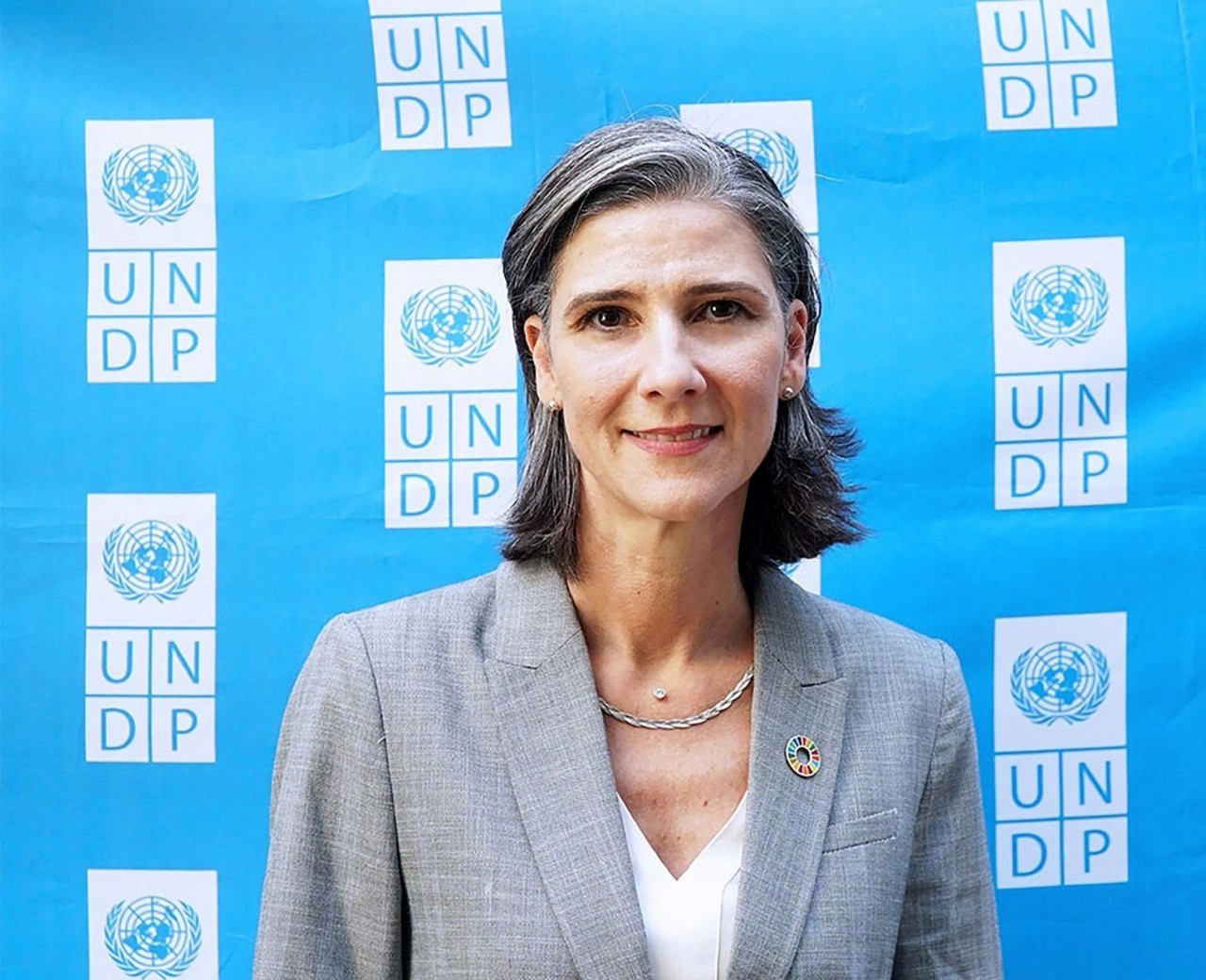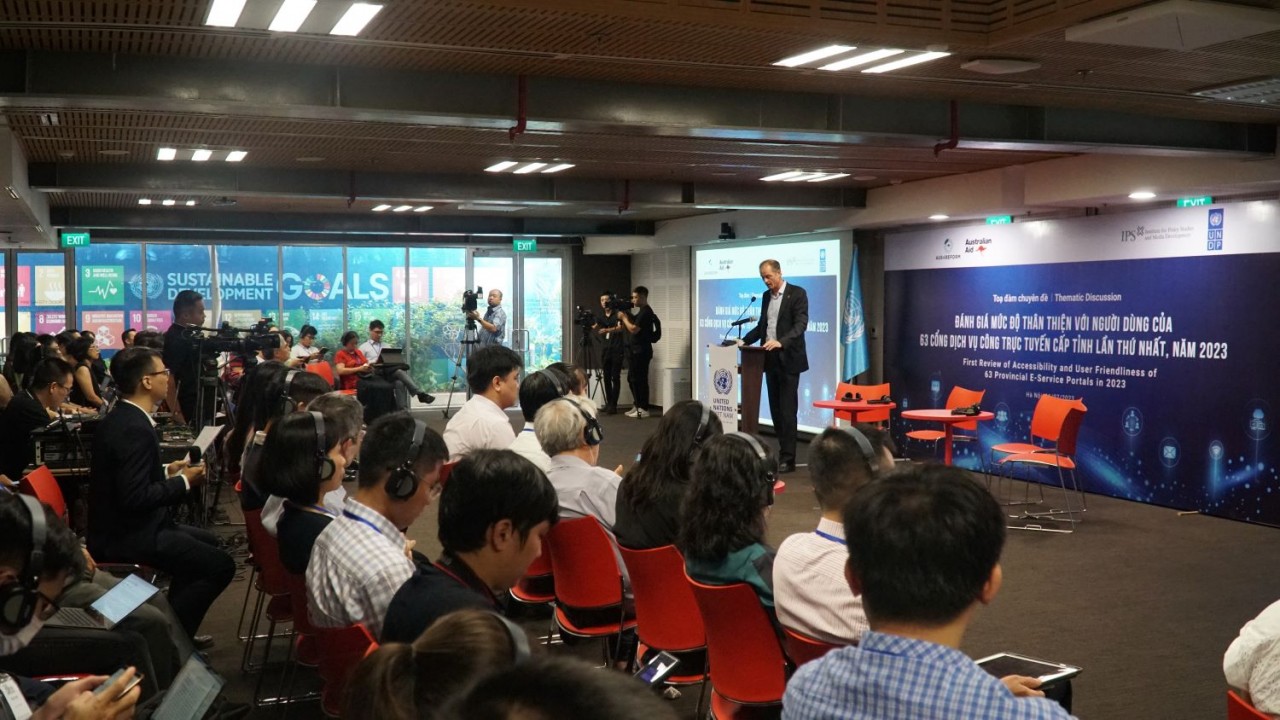
Vietnam prioritizes supporting citizens on digital transformation: UNDP Resident Representative Ramla Khalidi
Latest
 |
| Ms. Ramla Khalidi, UNDP Resident Representative in Vietam. (Souce: UNDP) |
Digital transformation has always been at the heart of UNDP's global work. As the Head of the United Nations Development Programme in Vietnam, how do you evaluate the digital transformation process here?
First of all, it is important to acknowledge that Vietnam has early on recognized the catalytic role of digitalization, establishing ambitious national targets of a prosperous digital country by 2030. Achieving these targets entail fundamental and comprehensive reforms in Government operations, the economic activities of businesses and the ways that people live and work.
The approval of the "National Digital Transformation Programme by 2025, with orientations toward 2030” by the Prime Minister in 2020, marked a key milestone in Viet Nam's digital development journey. The programme rightly places people at the centre, recognizing digital transformation as a key pathway to achieve the Sustainable Development Goals (SDGs).
Today, around three quarters of Vietnamese people are internet users, making Vietnam one of the most connected countries worldwide. However, there remains a considerable gap in digital literacy among Vietnamese users. This gap is particularly acute when it comes to e-commerce and digital services, where people particularly in rural areas still prefer to use cash rather than digital wallets or online bank accounts and financial services. UNDP’s most recent annual Vietnam Provincial Governance and Public Administration Performance Index (PAPI) survey in 2022 found that despite high internet penetration rates, less than five percent of respondents nationwide had accessed e-governance services via the National E-Service Portal. The development of effective online services needs to go hand-in-hand with awareness raising and development of digital literacy, supporting people to move from cash- and paper-based processes to access digital e-governance and financial services, cashless payments, and other digital services confidently and safely while maintaining options for those not yet able to access digital services.
How do you evaluate Vietnam's goal of becoming the leading digital economy in the ASEAN region by 2030?
The National Digital Transformation Programme reflects Vietnam’s aspiration to become a leading digital country and economy in the ASEAN region by 2030 and promote comprehensive testing of new technologies in the digital economy.
With this national programme, Vietnam has positioned itself well to leverage its potential in digital transformation. The total number of ICT personnel in Viet Nam has reached about 1.15 million people, with 160 universities nationwide offering technical training programmes in this area. By May 2022, and thanks to the direction provided by the national programme, all 63 provinces had established a Digital Transformation Steering Committee, and 55 out of 63 localities issued resolutions on digital transformation and 59 localities issued digital transformation programs/projects or plans for a period of five years, demonstrating concrete political determination to meet the targets that the Prime Minister set out. Furthermore, there has been robust adoption of digital transformation within businesses, with many ICT enterprises taking on a pioneering role in areas of research, development, and innovation, playing a significant role in advancing technology and contributing to the growth of the digital economy.
 |
| "Digital transformation has reached many mountainous provinces. (Source: UNDP) |
International cooperation is considered one of the solutions to help Vietnam quickly adapt to innovation. Can you give us some experiences from around the world that can be applied in Vietnam?
Electronic public procurement systems provide an online platform for public procurement processes, making the process more transparent and accountable. It also helps to reduce risks of corruption. Countries like Ukraine, Kenya, and Brazil have implemented electronic public procurement systems, with support from international organizations like the World Bank and the United Nations. In Vietnam, UNDP is supporting the National Centralised Drug Procurement Centre with digitalisation of their processes to improve both efficiency and transparency, while reducing corruption risks. In January 2024 the Centre, along with UNDP, launched a software to support drug reference price calculation. National roll-out of this software will particularly improve efficiency of the medicine procurement planning process in Vietnam.
In other examples, UNDP has partnered with the Government of Estonia to share Estonia’s widely recognized expertise in developing e-government platforms that ensure seamless interactions between the government and citizens. In Türkiye, UNDP is supporting digital transformation of small and medium enterprises (SMEs) through training and consultancy to develop integrated models to improve productivity and competitiveness. Viet Nam could adopt similar strategies to support its own SMEs to compete in the global marketplace in the Industrial Revolution 4.0 context.
In recent years, many countries have developed telehealth services that use online connectivity between different medical facilities, doctors, and patients to improve people’s access to quality health services. These services play an important role during disease outbreaks, by reducing the risk of disease transmission at health facilities. They also have an important role to play to serve remote and isolated communities, maintaining access to health services during natural disasters and extreme weather events driven by climate change, connecting local doctors with specialists who can advise on diagnosis, treatment and follow up of chronic diseases, saving travel time and costs for patients, and reducing overcrowding on higher-level health facilities.
In Vietvam, UNDP has worked closely with the Ministry of Health to develop and pilot the ‘Doctor for Everyone’ grassroots digital telehealth system. ‘Doctor for Everyone’, initially launched in response to the COVID-19 pandemic, connects commune health stations with provincial and district health facilities for specialist advice, supervision, and medical consultation activities. It also includes a free smartphone application that connects people with the health system. Since late 2020, Doctor for Everyone has been introduced to eight provinces throughout Vietnam, with a focus on remote, mountainous, and climate-vulnerable provinces. By the end of 2023, around 3,000 healthcare workers had already been trained on the system, more than 1.3 million community members have established accounts, and more than 70,000 telehealth-supported medical consultations have been organized. In the coming time, ‘Doctor for Everyone’ will expand to nine further provinceswith support from the Korean Foundation for International Healthcare (KOFIH) and the United States Agency for International Development (USAID), reaching a total of 17 provinces nationwide.
UNDP is ready to further share lessons and models developed through our global Digital Strategy that could be adapted by Vietnam to support national digital transformation.
Besides digital transformation, green transformation also brings opportunities and challenges for Viet Nam in the process of developing a circular economy. How do you evaluate this process as well as its prospects in Vietnam?
Accelerating the transition towards a circular economy presents a formidable vehicle for Vietnam to intensify the pace of progress and accomplish the SDGs by the end of the decade. This calls for a quantum leap in investments and efforts to activate three enablers we have identified as strategic because of their potential to generate cascading positive impacts, including “digital technologies and innovation.”
Despite ranking 86th globally for e-government in 2022, Vietnam faces challenges such as limited research and development funding (0.5% of GDP), coordination gaps in digital transformation, and insufficient digital infrastructure.
Increasing investment in digital technologies for CE could yield progress in material sciences and design, reduce costs for raw/volatile materials, provide access to new markets, and create new revenue streams, especially in the context of the latest free trade agreements.
Digital technologies can further provide multiple opportunities for circular businesses to thrive, such as sharing and reusing systems, product-as-a-service models, sourcing recycled content (in textiles, for example), increasing product circulation and asset utilisation through pricing and demand prediction, and developing intelligent value chain management. Tools such as AI, big data, and automation optimise resource use, improve transparency, and foster innovation.
For example, UNDP and MARD supported dragon-fruit farmers in Binh Thuan in adopting an e-traceability system to record and track their products' geographical location and carbon footprints, which helps improve transparency and build customers' confidence in the export market. UNDP and MONRE also established the first government led platform on Circular Economy, the Vietnam Circular Economy Hub, which welcomes more than 1,000 visitors every month eager to learn about CE practices in all sectors and want to connect with a network of partners.
 |
| Mr. Patrick Haverman, Deputy Resident Representative of UNDP in Vietnam, spoke at the Dialogue event: "Assessing the user-friendliness of 63 online public service portals" organized by the Institute of Policy Studies and Media Development (IPS) in collaboration with the United Nations Development Programme (UNDP). (Source: UNDP) |
How do you predict the process of innovation, digital transformation as well as green transformation in Vietnam?
Digitalization has the potential to empower marginalized communities, yet, the digital divide remains a concern and sustained and strategic efforts are needed to ensure that no-one is left behind. That includes in particular women, ethnic minorities, persons with disabilities and the elderly.
To position itself as the foremost digital economy within the ASEAN region, Vietnam must prioritize digital inclusion, ensuring that all citizens, especially those in vulnerable groups, are integral to its digitalization journey. A pertinent example of this approach can be seen in the realm of e-commerce for enterprises. Before delving into advanced e-commerce skills, it is crucial to establish a foundation of digital literacy and business readiness for online selling, which includes business model optimization and human resource management. A critical component of this process is the provision of personalized, 1:1 mentoring following the initial foundational training. Such follow-up is vital to ensure that the participants effectively apply the imparted knowledge and skills. This approach is particularly important for vulnerable groups, who may need more access to digital resources, or the necessary skill set for participating in the digital marketplace. By ensuring these preliminary steps, Vietnam not only promotes widespread digital competence but also fosters an inclusive environment where all sectors of society can contribute to and benefit from the digital economy.
One of the innovations to improve e-service is Artificial Intelligence (AI) for government chatbots. The adoption of AI and Natural Language Processing to develop chatbots for E-government service portals can significantly improve accessibility and efficiency of digital public service delivery, providing enhanced functionalities. The chatbots provide quick, simple, and efficient responses to citizens’ standard queries on conducting an administrative procedure such as submitting a birth registration. Available 24/7, chatbots can handle a large volume of queries, reducing the workload on human staff and improving efficiency. The chatbots are programmed to navigate complex webpages on behalf of users and provide simplified responses, greatly enhancing access to digital public services. AI-powered chatbots can help make e-services more inclusive by including a text-to-speech functionality, catering to the needs of marginalized groups such as people with disability or ethnic minorities. As with all matters related to AI, this has to be undertaken with caution to ensure transparent, accountable and equitable outcomes, avoiding unintended biases and potential privacy concerns.
Thank you!













